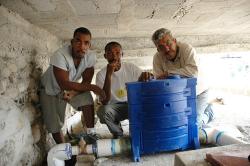Chlorinator Installation
The Problem: Unclean Community Water
The chlorination of water is a process few of us consider but all of us depend upon. Dirty water spreads disease, making kids miss school and adults miss work or worse. Despite this, water sanitation in Haiti is virtually non-existent. Many communities are in desperate need of dependable protection against the disease-causing bacteria common in the buckets, home storage tanks, and local piping of poor communities. Learn more about the health crisis in Haiti.
Our Solution: Installing Tablet Chlorinators
Our water chlorination systems offer reliable water protection for up to 10,000 Haitians per chlorinator. These tablet chlorinators produce a steady, preset level of chlorination that purifies the water for days. Chlorination is safe and easy-to-maintain, and no electricity is needed. Unlike gas and liquid chlorine, which are dangerous and unstable, our chlorine tablets can be stored in harsh conditions and handled by amateurs. The chlorinators operate on the water’s own gravity flow, so no additional equipment is necessary.

Our projects look toward sustainability. We seek to encourage local “ownership” of each water system and teach local people the skills needed to maintain the chlorine system for years. Local water boards are trained by International Action staff to adjust chlorine levels, make minor repairs, and educate their neighbors about the value of clean water.
Additionally, our staff rides the circuit of installed chlorinators once a month to check on maintenance and answer questions raised by local water boards. The water board serves as our vital point of contact within the community. They ensure our work is suited to the community’s needs and encourage the community to embrace and protect its new water system.
If you’d like to request chlorinator installation, fill out our Help Request Form.
Curious about specifics?
Read a study conducted about the efficacy of chlorinators like ours in A Comparison of Two Systems for Chlorinating Water in Rural Honduras (PDF, 168 KB).
For further reading, check out this presentation: Recommendations to USAID/Haiti for LF-Series Tablet Feeder Chlorinators (PPT, 516 KB).
